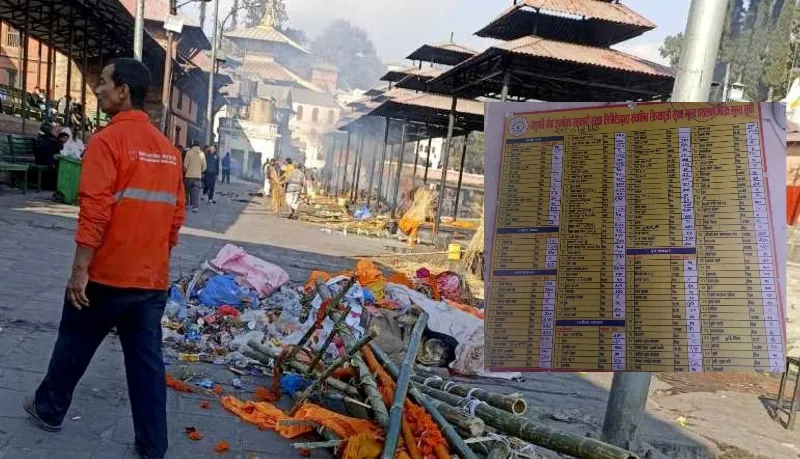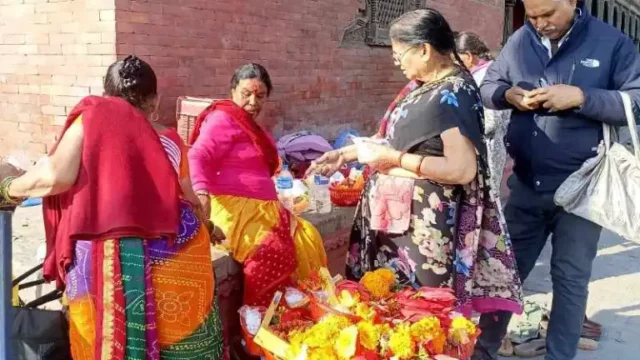0%

A scene at the Pashupati Aryaghat.
KATHMANDU: While Aryaghat serves as the ultimate destination for many, the philosophical realization dawns at Pashupati Aryaghat that the grasp of expensive and black market practices transcends even the threshold of death, marking what seems to be the ultimate exploitation in human life.
This week, Santosh Misra from Sarlahi visited Pashupati Aryaghat to perform the last rites for his relatives.
Clutching a bottle of water in hand, a modest relief amidst the pyres, Misra purchased water at the Aryaghat for Rs.30.
Misra, a Kathmandu resident pursuing his studies, had traveled to Aryaghat taking part in the final rituals following the demise of a relative who had been brought to Kathmandu for medical treatment from the village.
Opting for Aryaghat over the village for cremation due to its cost-effectiveness, Misra highlighted the financial strain his family endured while caring for their ailing relative.
A heartrending reality unfolds for those, like Misra, who arrive at Aryaghat burdened with grief – no solace is offered in the form of a simple glass of water.
Similar grievances extend to the vicinity of the houses near Pashupati where mourners carry out their 13-day rituals, where even a simple cup of tea, priced at Rs 20 elsewhere, is charged at Rs 30 in the shop adjacent to those houses.
Instead, they are compelled to purchase it at prices exceeding the market rates, encapsulating the last exploitation in their journey of life and death.
Mourning Families Bear the Brunt
The solemn process of cremation at Aryaghat, taking three to four hours to complete, reveals a distressing reality for those in grief.
Misra laments the unfortunate necessity of purchasing water at inflated prices during such a crucial time, emphasizing the irony of higher costs at a place meant for solace.

Binod Choudhary, accompanying Misra, echoes the sentiment, expressing dissatisfaction with the elevated prices of all materials at Aryaghat.
In a disheartening turn of events, Indian tourists at Aryaghat found themselves engaged in haggling matches over the prices of flowers and worship materials.
He points out the discrepancy in water prices, stating, “Water, available for 20 rupees outside, costs 30 rupees here at the Aryaghat.”
Similar grievances extend to the vicinity of the houses near Pashupati where mourners carry out their 13-day rituals, where even a simple cup of tea, priced at Rs 20 elsewhere, is charged at Rs 30 in the shop adjacent to those houses.
Bikas Maharjan, a resident of Kathmandu, found himself grappling with the high cost of flowers in the Pashupati area.
He had arrived at Aryaghat ahead of bringing the deceased, following family advice to adorn the body with flowers.
Expressing discontent, Maharjan emphasized that while flowers are used not only for mourning but also for worship or marriage, their prices should not be exorbitant at Aryaghat.
In a poignant plea, Maharjan stated, “Everyone wishes to bid farewell to their family member in a dignified manner. However, the somber reality demands bargaining at Aryaghat during such a sorrowful time.”
He urged the Pashupati Area Development Trust (PADT) to create an environment at Aryaghat where people are not exploited, emphasizing the need to prevent cheating during such vulnerable moments.
While the facilities are comprehensive, including shopping necessities and options for more comfortable bedding, Poudel emphasized the necessity for places facilitating mandatory rituals at minimal costs.
In a disheartening turn of events, Indian tourists at Aryaghat found themselves engaged in haggling matches over the prices of flowers and worship materials.
Traders, in turn, were accused of harassing them, prompting concerns over arbitrary pricing in this sacred place.
A religious tourist from Agra, India, expressed disappointment, stating, “We are from a neighboring country. Charging excessively in a holy place like a temple is unjustifiable.”
Located just below Aryaghat is the house where mourners carry out their rituals, managing everything from accommodations to rituals.
However, Majoj Poudel from Rupandehi highlighted that despite the convenience in terms of management, the expenses there are exorbitant for common people.
Poudel, having completed his mother’s 13-day rites, disclosed spending Rs 1.5 million during that period.
As the only son, Poudel, acknowledging that expenses could be reduced for those with more family members.
While the facilities are comprehensive, including shopping necessities and options for more comfortable bedding, Poudel emphasized the necessity for places facilitating mandatory rituals at minimal costs.
He noted, “This is where people come to perform their last rites after death. Not everyone may have the resources, and the place for essential rituals should be available at a minimum price.”
These incidents shed light on the existence of a black market at Aryaghat, where essential items like water and flowers are subject to arbitrarily high prices.
Addressing concerns over flower traders, Adhikari notes, “They are traders, aiming for profit, but if they are found causing undue suffering to customers or abusing pricing, corrective action will be taken.”
Despite the presence of a public price list for goods required in Pashupati, some items surpass the specified prices, raising concerns about fair pricing in this sacred space.
PADT Vows Action Against Overcharging
Rewathi Adhikari, the spokesperson for the PADT, asserts that no materials within the Pashupati premises should be bought or sold at prices exceeding the market rates.
Adhikari emphasizes the sacred nature of the temple, stating, “As soon as the temple is entered, there is a sense of reverence.”
Additionally, the Fund is actively addressing concerns regarding the existence of a potential black market, particularly in locations like Aryaghat.

Adhikari claims that the Fund is diligently monitoring individuals visiting the Aryaghat three times a day to prevent any instances of exploitation.
However, he acknowledges that increased vigilance, especially during evening hours after employees’ duty periods, is essential to curb any potential malpractices by traders.
He assured that the Trust remains committed to preventing traders from engaging in exploitative practices at places like Aryaghat.
Addressing concerns over flower traders, Adhikari notes, “They are traders, aiming for profit, but if they are found causing undue suffering to customers or abusing pricing, corrective action will be taken.”
The Trust pledges to intensify surveillance measures to deter any black market activities in revered places such as temples and Aryaghats.